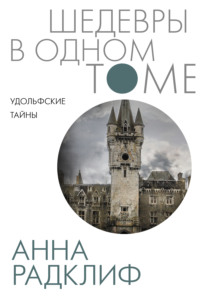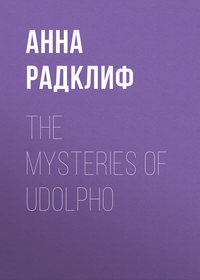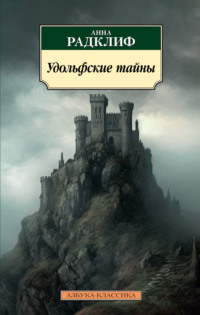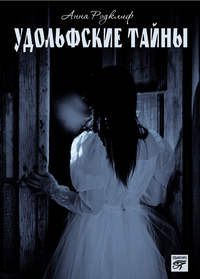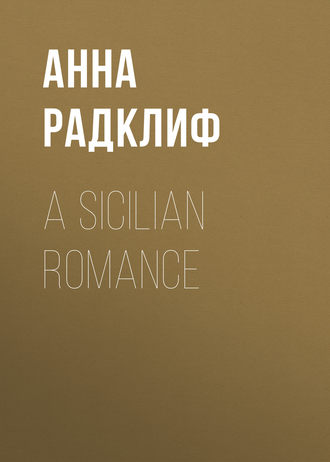 полная версия
полная версияA Sicilian Romance
From Julia's mind the idea of happiness was now faded. Pleasure had withdrawn her beam from the prospect, and the objects no longer illumined by her ray, became dark and colourless. As often as her situation would permit, she withdrew from society, and sought the freedom of solitude, where she could indulge in melancholy thoughts, and give a loose to that despair which is so apt to follow the disappointment of our first hopes.
Week after week elapsed, yet no mention was made of returning to Naples. The marquis at length declared it his intention to spend the remainder of the summer in the castle. To this determination the marchioness submitted with decent resignation, for she was here surrounded by a croud of flatterers, and her invention supplied her with continual diversions: that gaiety which rendered Naples so dear to her, glittered in the woods of Mazzini, and resounded through the castle.
The apartments of Madame de Menon were spacious and noble. The windows opened upon the sea, and commanded a view of the straits of Messina, bounded on one side by the beautiful shores of the isle of Sicily, and on the other by the high mountains of Calabria. The straits, filled with vessels whose gay streamers glittered to the sun-beam, presented to the eye an ever-moving scene. The principal room opened upon a gallery that overhung the grand terrace of the castle, and it commanded a prospect which for beauty and extent has seldom been equalled. These were formerly considered the chief apartments of the castle; and when the Marquis quitted them for Naples, were allotted for the residence of Madame de Menon, and her young charge. The marchioness, struck with the prospect which the windows afforded, and with the pleasantness of the gallery, determined to restore the rooms to their former splendour. She signified this intention to madame, for whom other apartments were provided. The chambers of Emilia and Julia forming part of the suite, they were also claimed by the marchioness, who left Julia only her favorite closet. The rooms to which they removed were spacious, but gloomy; they had been for some years uninhabited; and though preparations had been made for the reception of their new inhabitants, an air of desolation reigned within them that inspired melancholy sensations. Julia observed that her chamber, which opened beyond madame's, formed a part of the southern building, with which, however, there appeared no means of communication. The late mysterious circumstances relating to this part of the fabric, now arose to her imagination, and conjured up a terror which reason could not subdue. She told her emotions to madame, who, with more prudence than sincerity, laughed at her fears. The behaviour of the marquis, the dying words of Vincent, together with the preceding circumstances of alarm, had sunk deep in the mind of madame, but she saw the necessity of confining to her own breast doubts which time only could resolve.
Julia endeavoured to reconcile herself to the change, and a circumstance soon occurred which obliterated her present sensations, and excited others far more interesting. One day that she was arranging some papers in the small drawers of a cabinet that stood in her apartment, she found a picture which fixed all her attention. It was a miniature of a lady, whose countenance was touched with sorrow, and expressed an air of dignified resignation. The mournful sweetness of her eyes, raised towards Heaven with a look of supplication, and the melancholy languor that shaded her features, so deeply affected Julia, that her eyes were filled with involuntary tears. She sighed and wept, still gazing on the picture, which seemed to engage her by a kind of fascination. She almost fancied that the portrait breathed, and that the eyes were fixed on hers with a look of penetrating softness. Full of the emotions which the miniature had excited, she presented it to madame, whose mingled sorrow and surprise increased her curiosity. But what were the various sensations which pressed upon her heart, on learning that she had wept over the resemblance of her mother! Deprived of a mother's tenderness before she was sensible of its value, it was now only that she mourned the event which lamentation could not recall. Emilia, with an emotion as exquisite, mingled her tears with those of her sister. With eager impatience they pressed madame to disclose the cause of that sorrow which so emphatically marked the features of their mother.
'Alas! my dear children,' said madame, deeply sighing, 'you engage me in a task too severe, not only for your peace, but for mine; since in giving you the information you require, I must retrace scenes of my own life, which I wish for ever obliterated. It would, however, be both cruel and unjust to withhold an explanation so nearly interesting to you, and I will sacrifice my own ease to your wishes.
'Louisa de Bernini, your mother, was, as you well know, the only daughter of the Count de Bernini. Of the misfortunes of your family, I believe you are yet ignorant. The chief estates of the count were situated in the Val di Demona, a valley deriving its name from its vicinity to Mount AEtna, which vulgar tradition has peopled with devils. In one of those dreadful eruptions of AEtna, which deluged this valley with a flood of fire, a great part of your grandfather's domains in that quarter were laid waste. The count was at that time with a part of his family at Messina, but the countess and her son, who were in the country, were destroyed. The remaining property of the count was proportionably inconsiderable, and the loss of his wife and son deeply affected him. He retired with Louisa, his only surviving child, who was then near fifteen, to a small estate near Cattania. There was some degree of relationship between your grandfather and myself; and your mother was attached to me by the ties of sentiment, which, as we grew up, united us still more strongly than those of blood. Our pleasures and our tastes were the same; and a similarity of misfortunes might, perhaps, contribute to cement our early friendship. I, like herself, had lost a parent in the eruption of AEtna. My mother had died before I understood her value; but my father, whom I revered and tenderly loved, was destroyed by one of those terrible events; his lands were buried beneath the lava, and he left an only son and myself to mourn his fate, and encounter the evils of poverty. The count, who was our nearest surviving relation, generously took us home to his house, and declared that he considered us as his children. To amuse his leisure hours, he undertook to finish the education of my brother, who was then about seventeen, and whose rising genius promised to reward the labours of the count. Louisa and myself often shared the instruction of her father, and at those hours Orlando was generally of the party. The tranquil retirement of the count's situation, the rational employment of his time between his own studies, the education of those whom he called his children, and the conversation of a few select friends, anticipated the effect of time, and softened the asperities of his distress into a tender complacent melancholy. As for Louisa and myself, who were yet new in life, and whose spirits possessed the happy elasticity of youth, our minds gradually shifted from suffering to tranquillity, and from tranquillity to happiness. I have sometimes thought that when my brother has been reading to her a delightful passage, the countenance of Louisa discovered a tender interest, which seemed to be excited rather by the reader than by the author. These days, which were surely the most enviable of our lives, now passed in serene enjoyments, and in continual gradations of improvement.
'The count designed my brother for the army, and the time now drew nigh when he was to join the Sicilian regiment, in which he had a commission. The absent thoughts, and dejected spirits of my cousin, now discovered to me the secret which had long been concealed even from herself; for it was not till Orlando was about to depart, that she perceived how dear he was to her peace. On the eve of his departure, the count lamented, with fatherly yet manly tenderness, the distance which was soon to separate us. "But we shall meet again," said he, "when the honors of war shall have rewarded the bravery of my son." Louisa grew pale, a half suppressed sigh escaped her, and, to conceal her emotion, she turned to her harpsichord.
'My brother had a favorite dog, which, before he set off, he presented to Louisa, and committing it to her care, begged she would be kind to it, and sometimes remember its master. He checked his rising emotion, but as he turned from her, I perceived the tear that wetted his cheek. He departed, and with him the spirit of our happiness seemed to evaporate. The scenes which his presence had formerly enlivened, were now forlorn and melancholy, yet we loved to wander in what were once his favorite haunts. Louisa forbore to mention my brother even to me, but frequently, when she thought herself unobserved, she would steal to her harpsichord, and repeat the strain which she had played on the evening before his departure.
'We had the pleasure to hear from time to time that he was well: and though his own modesty threw a veil over his conduct, we could collect from other accounts that he had behaved with great bravery. At length the time of his return approached, and the enlivened spirits of Louisa declared the influence he retained in her heart. He returned, bearing public testimony of his valour in the honors which had been conferred upon him. He was received with universal joy; the count welcomed him with the pride and fondness of a father, and the villa became again the seat of happiness. His person and manners were much improved; the elegant beauty of the youth was now exchanged for the graceful dignity of manhood, and some knowledge of the world was added to that of the sciences. The joy which illumined his countenance when he met Louisa, spoke at once his admiration and his love; and the blush which her observation of it brought upon her cheek, would have discovered, even to an uninterested spectator, that this joy was mutual.
'Orlando brought with him a young Frenchman, a brother officer, who had rescued him from imminent danger in battle, and whom he introduced to the count as his preserver. The count received him with gratitude and distinction, and he was for a considerable time an inmate at the villa. His manners were singularly pleasing, and his understanding was cultivated and refined. He soon discovered a partiality for me, and he was indeed too pleasing to be seen with indifference. Gratitude for the valuable life he had preserved, was perhaps the groundwork of an esteem which soon increased into the most affectionate love. Our attachment grew stronger as our acquaintance increased; and at length the chevalier de Menon asked me of the count, who consulted my heart, and finding it favorable to the connection, proceeded to make the necessary enquiries concerning the family of the stranger. He obtained a satisfactory and pleasing account of it. The chevalier was the second son of a French gentleman of large estates in France, who had been some years deceased. He had left several sons; the family-estate, of course, devolved to the eldest, but to the two younger he had bequeathed considerable property. Our marriage was solemnized in a private manner at the villa, in the presence of the count, Louisa, and my brother. Soon after the nuptials, my husband and Orlando were remanded to their regiments. My brother's affections were now unalterably fixed upon Louisa, but a sentiment of delicacy and generosity still kept him silent. He thought, poor as he was, to solicit the hand of Louisa, would be to repay the kindness of the count with ingratitude. I have seen the inward struggles of his heart, and mine has bled for him. The count and Louisa so earnestly solicited me to remain at the villa during the campaign, that at length my husband consented. We parted—O! let me forget that period!—Had I accompanied him, all might have been well; and the long, long years of affliction which followed had been spared me.'
The horn now sounded the signal for dinner, and interrupted the narrative of Madame. Her beauteous auditors wiped the tears from their eyes, and with extreme reluctance descended to the hall. The day was occupied with company and diversions, and it was not till late in the evening that they were suffered to retire. They hastened to madame immediately upon their being released; and too much interested for sleep, and too importunate to be repulsed, solicited the sequel of her story. She objected the lateness of the hour, but at length yielded to their entreaties. They drew their chairs close to hers; and every sense being absorbed in the single one of hearing, followed her through the course of her narrative.
'My brother again departed without disclosing his sentiments; the effort it cost him was evident, but his sense of honor surmounted every opposing consideration. Louisa again drooped, and pined in silent sorrow. I lamented equally for my friend and my brother; and have a thousand times accused that delicacy as false, which withheld them from the happiness they might so easily and so innocently have obtained. The behaviour of the count, at least to my eye, seemed to indicate the satisfaction which this union would have given him. It was about this period that the marquis Mazzini first saw and became enamoured of Louisa. His proposals were very flattering, but the count forbore to exert the undue authority of a father; and he ceased to press the connection, when he perceived that Louisa was really averse to it. Louisa was sensible of the generosity of his conduct, and she could scarcely reject the alliance without a sigh, which her gratitude paid to the kindness of her father.
'But an event now happened which dissolved at once our happiness, and all our air-drawn schemes for futurity. A dispute, which it seems originated in a trifle, but soon increased to a serious degree, arose between the Chevalier de Menon and my brother. It was decided by the sword, and my dear brother fell by the hand of my husband. I shall pass over this period of my life. It is too painful for recollection. The effect of this event upon Louisa was such as may be imagined. The world was now become indifferent to her, and as she had no prospect of happiness for herself, she was unwilling to withhold it from the father who had deserved so much of her. After some time, when the marquis renewed his addresses, she gave him her hand. The characters of the marquis and his lady were in their nature too opposite to form a happy union. Of this Louisa was very soon sensible; and though the mildness of her disposition made her tamely submit to the unfeeling authority of her husband, his behaviour sunk deep in her heart, and she pined in secret. It was impossible for her to avoid opposing the character of the marquis to that of him upon whom her affections had been so fondly and so justly fixed. The comparison increased her sufferings, which soon preyed upon her constitution, and very visibly affected her health. Her situation deeply afflicted the count, and united with the infirmities of age to shorten his life.
'Upon his death, I bade adieu to my cousin, and quitted Sicily for Italy, where the Chevalier de Menon had for some time expected me. Our meeting was very affecting. My resentment towards him was done away, when I observed his pale and altered countenance, and perceived the melancholy which preyed upon his heart. All the airy vivacity of his former manner was fled, and he was devoured by unavailing grief and remorse. He deplored with unceasing sorrow the friend he had murdered, and my presence seemed to open afresh the wounds which time had begun to close. His affliction, united with my own, was almost more than I could support, but I was doomed to suffer, and endure yet more. In a subsequent engagement my husband, weary of existence, rushed into the heat of battle, and there obtained an honorable death. In a paper which he left behind him, he said it was his intention to die in that battle; that he had long wished for death, and waited for an opportunity of obtaining it without staining his own character by the cowardice of suicide, or distressing me by an act of butchery. This event gave the finishing stroke to my afflictions;—yet let me retract;—another misfortune awaited me when I least expected one. The Chevalier de Menon died without a will, and his brothers refused to give up his estate, unless I could produce a witness of my marriage. I returned to Sicily, and, to my inexpressible sorrow, found that your mother had died during my stay abroad, a prey, I fear, to grief. The priest who performed the ceremony of my marriage, having been threatened with punishment for some ecclesiastical offences, had secretly left the country; and thus was I deprived of those proofs which were necessary to authenticate my claims to the estates of my husband. His brothers, to whom I was an utter stranger, were either too prejudiced to believe, or believing, were too dishonorable to acknowledge the justice of my claims. I was therefore at once abandoned to sorrow and to poverty; a small legacy from the count de Bernini being all that now remained to me.
'When the marquis married Maria de Vellorno, which was about this period, he designed to quit Mazzini for Naples. His son was to accompany him, but it was his intention to leave you, who were both very young, to the care of some person qualified to superintend your education. My circumstances rendered the office acceptable, and my former friendship for your mother made the duty pleasing to me. The marquis was, I believe, glad to be spared the trouble of searching further for what he had hitherto found it difficult to obtain—a person whom inclination as well as duty would bind to his interest.'
Madame ceased to speak, and Emilia and Julia wept to the memory of the mother, whose misfortunes this story recorded. The sufferings of madame, together with her former friendship for the late marchioness, endeared her to her pupils, who from this period endeavoured by every kind and delicate attention to obliterate the traces of her sorrows. Madame was sensible of this tenderness, and it was productive in some degree of the effect desired. But a subject soon after occurred, which drew off their minds from the consideration of their mother's fate to a subject more wonderful and equally interesting.
One night that Emilia and Julia had been detained by company, in ceremonial restraint, later than usual, they were induced, by the easy conversation of madame, and by the pleasure which a return to liberty naturally produces, to defer the hour of repose till the night was far advanced. They were engaged in interesting discourse, when madame, who was then speaking, was interrupted by a low hollow sound, which arose from beneath the apartment, and seemed like the closing of a door. Chilled into a silence, they listened and distinctly heard it repeated. Deadly ideas crowded upon their imaginations, and inspired a terror which scarcely allowed them to breathe. The noise lasted only for a moment, and a profound silence soon ensued. Their feelings at length relaxed, and suffered them to move to Emilia's apartment, when again they heard the same sounds. Almost distracted with fear, they rushed into madame's apartment, where Emilia sunk upon the bed and fainted. It was a considerable time ere the efforts of madame recalled her to sensation. When they were again tranquil, she employed all her endeavours to compose the spirits of the young ladies, and dissuade them from alarming the castle. Involved in dark and fearful doubts, she yet commanded her feelings, and endeavoured to assume an appearance of composure. The late behaviour of the marquis had convinced her that he was nearly connected with the mystery which hung over this part of the edifice; and she dreaded to excite his resentment by a further mention of alarms, which were perhaps only ideal, and whose reality she had certainly no means of proving.
Influenced by these considerations, she endeavoured to prevail on Emilia and Julia to await in silence some confirmation of their surmises; but their terror made this a very difficult task. They acquiesced, however, so far with her wishes, as to agree to conceal the preceding circumstances from every person but their brother, without whose protecting presence they declared it utterly impossible to pass another night in the apartments. For the remainder of this night they resolved to watch. To beguile the tediousness of the time they endeavoured to converse, but the minds of Emilia and Julia were too much affected by the late occurrence to wander from the subject. They compared this with the foregoing circumstance of the figure and the light which had appeared; their imaginations kindled wild conjectures, and they submitted their opinions to madame, entreating her to inform them sincerely, whether she believed that disembodied spirits were ever permitted to visit this earth.
'My children,' said she, 'I will not attempt to persuade you that the existence of such spirits is impossible. Who shall say that any thing is impossible to God? We know that he has made us, who are embodied spirits; he, therefore, can make unembodied spirits. If we cannot understand how such spirits exist, we should consider the limited powers of our minds, and that we cannot understand many things which are indisputably true. No one yet knows why the magnetic needle points to the north; yet you, who have never seen a magnet, do not hesitate to believe that it has this tendency, because you have been well assured of it, both from books and in conversation. Since, therefore, we are sure that nothing is impossible to God, and that such beings may exist, though we cannot tell how, we ought to consider by what evidence their existence is supported. I do not say that spirits have appeared; but if several discreet unprejudiced persons were to assure me that they had seen one, I should not be proud or bold enough to reply—'it is impossible.' Let not, however, such considerations disturb your minds. I have said thus much, because I was unwilling to impose upon your understandings; it is now your part to exercise your reason, and preserve the unmoved confidence of virtue. Such spirits, if indeed they have ever been seen, can have appeared only by the express permission of God, and for some very singular purposes; be assured that there are no beings who act unseen by him; and that, therefore, there are none from whom innocence can ever suffer harm.'
No further sounds disturbed them for that time; and before the morning dawned, weariness insensibly overcame apprehension, and sunk them in repose.
When Ferdinand learned the circumstances relative to the southern side of the castle, his imagination seized with avidity each appearance of mystery, and inspired him with an irresistible desire to penetrate the secrets of his desolate part of the fabric. He very readily consented to watch with his sisters in Julia's apartment; but as his chamber was in a remote part of the castle, there would be some difficulty in passing unobserved to her's. It was agreed, however, that when all was hushed, he should make the attempt. Having thus resolved, Emilia and Julia waited the return of night with restless and fearful impatience.
At length the family retired to rest. The castle clock had struck one, and Julia began to fear that Ferdinand had been discovered, when a knocking was heard at the door of the outer chamber.
Her heart beat with apprehensions, which reason could not justify. Madame rose, and enquiring who was there, was answered by the voice of Ferdinand. The door was cheerfully opened. They drew their chairs round him, and endeavoured to pass the time in conversation; but fear and expectation attracted all their thoughts to one subject, and madame alone preserved her composure. The hour was now come when the sounds had been heard the preceding night, and every ear was given to attention. All, however, remained quiet, and the night passed without any new alarm.
The greater part of several succeeding nights were spent in watching, but no sounds disturbed their silence. Ferdinand, in whose mind the late circumstances had excited a degree of astonishment and curiosity superior to common obstacles, determined, if possible, to gain admittance to those recesses of the castle, which had for so many years been hid from human eye. This, however, was a design which he saw little probability of accomplishing, for the keys of that part of the edifice were in the possession of the marquis, of whose late conduct he judged too well to believe he would suffer the apartments to be explored. He racked his invention for the means of getting access to them, and at length recollected that Julia's chamber formed a part of these buildings, it occurred to him, that according to the mode of building in old times, there might formerly have been a communication between them. This consideration suggested to him the possibility of a concealed door in her apartment, and he determined to survey it on the following night with great care.





